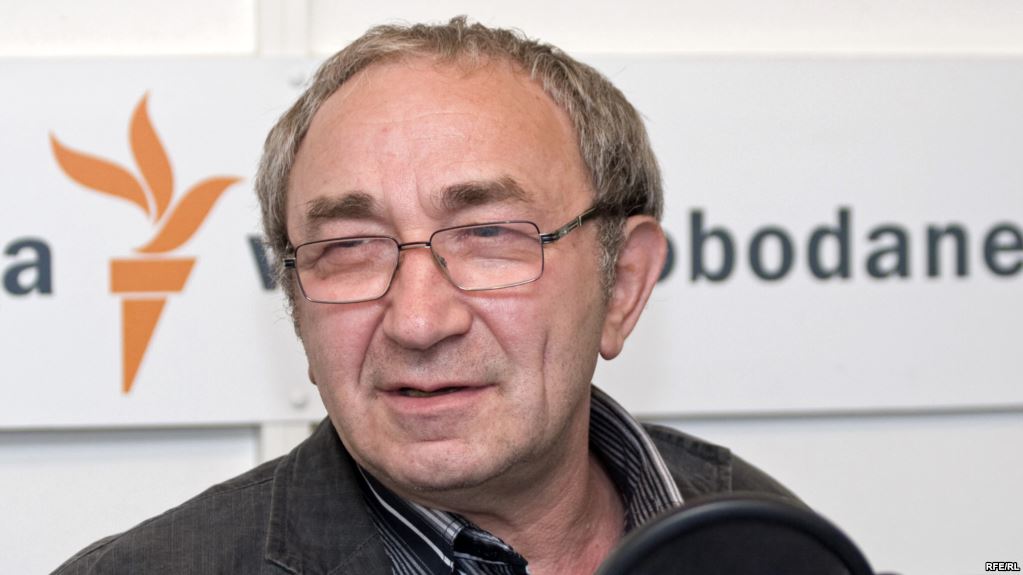R.I.P. Russia’s Arseny Roginsky: “one of the great warriors against forgetting.”
Wednesday, December 20th, 2017
Arseny Roginsky, 1946-2017: “what decency itself sounds like.” (Photo: Radio Free Europe/Radio Liberty)
Every year I have waited for the Nobel Peace Prize, wondering if at last Russia’s Memorial will be honored for its formidable work of retrieving memory of what Russia chooses to forget: the massacres and persecutions of the Soviet era. Memorial has fostered research on the arrests, imprisonments, murders and exiles, and commemorated them, while campaigning for human rights in modern Russia.
If it happens, whenever it happens, the Swedish honor will come too late for its founder, the historian and dissident Arseny Roginsky, who died on Monday at the age of 71. I was preparing to write something on this death for a man whose name too few in the West will recognize, but David Remnick, who knew Roginsky personally, beat me to it. He wrote an excellent tribute in the New Yorker yesterday, and I can do no better than to cite it:
“The struggle of man against power is the struggle of memory against forgetting.” The line comes from one of Milan Kundera’s novels about the totalitarian experience in the twentieth century, The Book of Laughter and Forgetting. Now, in the twenty-first century, as the forces allied against democratic institutions employ historical falsehoods once more as a kind of distorting mirror, it is especially painful to lose Arseny Roginsky, one of the great warriors against forgetting.
Roginsky, who died on Monday, at the age of seventy-one, was a Soviet and Russian dissident in the tradition of Andrei Sakharov, Andrei Sinyavsky, and Nadezhda Mandelstam. He was pure of heart but hardly sanctimonious. And his achievement was immense. In the late eighties, Roginsky helped found Memorial, an organization determined to uncover the truths of Soviet history in defiance of the forces of censorship and repression. He was as brave as any human-rights campaigner I’ve known, but he was also funny, ironic, eternally bemused even in the face of what he had endured and, more, his country’s dark history and forbidding present. When I lived in Moscow, and for years after, I looked forward to our frequent meetings and his expansive monologues; as a blue-gray nimbus of cigarette smoke accumulated around him, he gave seminars not only in matters of historical fact but in what decency itself sounds like.
For that, this unassuming warrior – whose father died in a gulag when Roginsky was nine years old – was harassed, bugged, arrested, and eventually incarcerated, moving from camp to camp for years to keep him from “infecting” other inmates:

In younger, colder days…
When Roginsky finally returned home, in 1985, Mikhail Gorbachev was coming to power with reform in mind. Sensing opportunity on an unprecedented scale, Roginsky joined forces, in 1988 and 1989, with a range of urban intellectuals and pro-democracy forces to start Memorial, one of the most important “informal” organizations in a nascent civil-society movement. Memorial put historical truth-telling at the top of its agenda, but it also served as a free-floating forum for discussion about the future of the intelligentsia and the country itself. On weekend mornings, I often went to meetings of Memorial to listen to speeches, meet with its leaders and younger followers, and, generally, to get a sense of where the movement was headed. Because where Memorial went, Gorbachev was often apt to follow. One of Gorbachev’s most important achievements was to insist that the future depended on an honest assessment of the past; this was the guiding principle of Memorial and Arseny Roginsky.
Here’s what he was working against, in an article, “The Gulag: Lest We Forget,” written by Anne Applebaum a dozen years ago, which illustrates the enormous importance of his work:
And yet in Russia, a country accustomed to grandiose war memorials and vast, solemn state funerals, these local efforts and private initiatives seem meager, scattered, and incomplete. The majority of Russians are probably not even aware of them. And no wonder: Ten years after the collapse of the Soviet Union, Russia—the country that has inherited the Soviet Union’s diplomatic and foreign policies, its embassies, its debts, and its seat at the United Nations—continues to act as if it has not inherited the Soviet Union’s history. Russia does not have a national museum dedicated to the history of repression. Neither does Russia have a national place of mourning, a monument officially recognizing the suffering of victims and their families.
.
More notable than the missing monuments, however, is the missing public awareness. Sometimes it seems as if the enormous emotions and passions raised by the wide-ranging discussions of the Gorbachev era simply vanished, along with the Soviet Union itself. The bitter debate about justice for the victims disappeared just as abruptly. Although there was much talk about it at the end of the 1980s, the Russian government never did examine or try the perpetrators of torture or mass murder, even those who were identifiable.
Why should it have gotten the Nobel? One reason: the future of Memorial is up for grabs in Putin’s Russia, and it work desperately needs the international recognition that will protect its work:
Under the Putin regime, Memorial has done invaluable research and advocacy work on abuses in the North Caucasus and other troubled regions of Russia. It remains a human-rights organization, despite heavy pressure from the Kremlin, which has little interest in human rights and regards Memorial as a “foreign agent.” Periodically, Russian politicians have threatened to close Memorial entirely. As Memorial’s chairman, Roginsky was always preternaturally calm yet unyielding.
Read the whole Remnick piece here.
“Thank you, Arseny Borisovich, you will always be with us,” Memorial said in the statement on its website.


